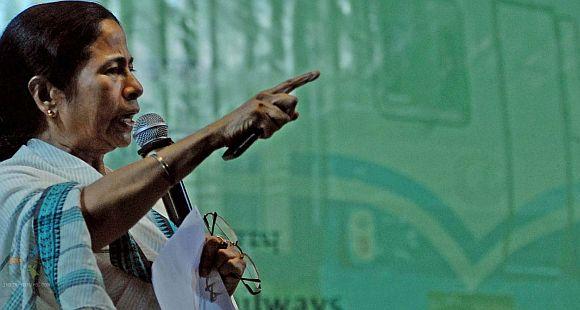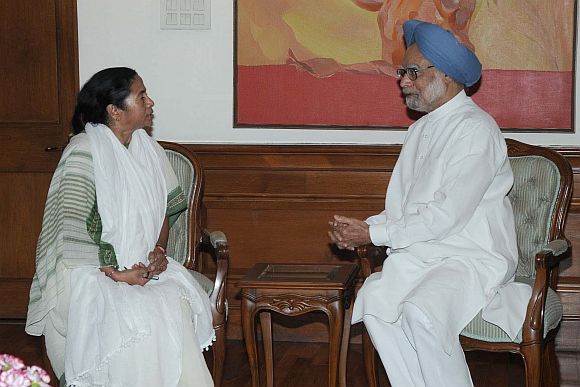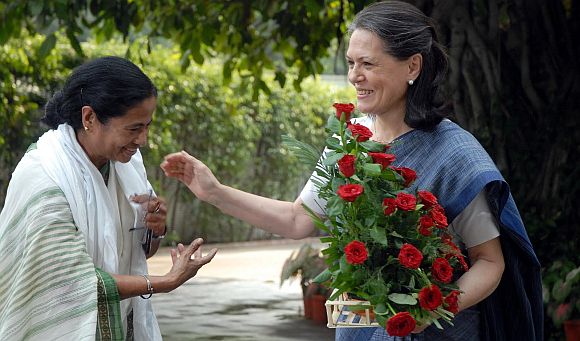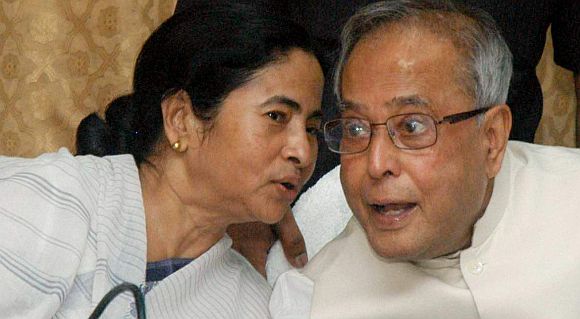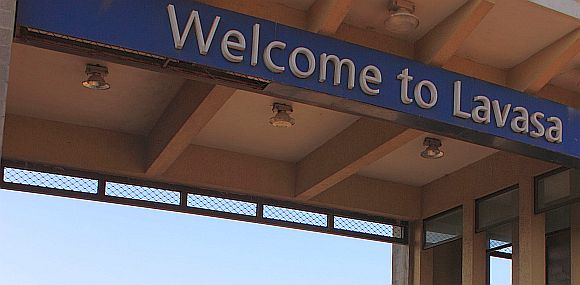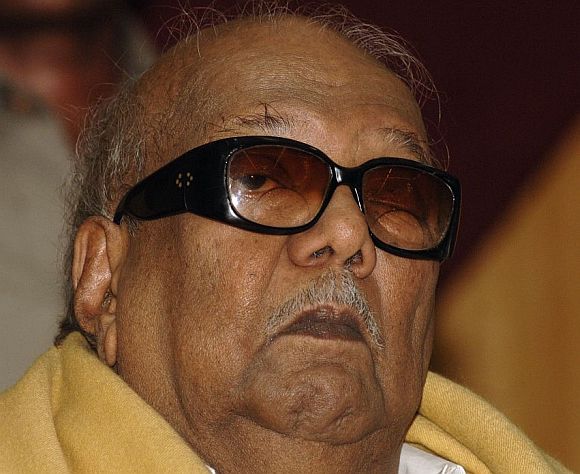 | « Back to article | Print this article |
Why Mamata's gameplan is giving Congress the jitters
The more Mamata Banerjee ups the ante on contentious issues in the coming weeks, which she is expected to do, the more she and other allies will be in a position to extract their pound of flesh for their continued support to the government, says Neerja Chowdhury
The Union government heaved a sigh of relief earlier this week when West Bengal Chief Minister Mamata Banerjee went back on her ultimatum issued after the government decided to hike the price of petrol last week, that she would withdraw her ministers from the United Progressive Alliance government.
But the relations between her Trinamool Congress and the Congress remain tense.
Even as her MPs met the prime minister at 7, Race Course Road, in what was clearly a photo op, she was ensconced with Finance Minister Pranab Mukherjee in the more crucial meeting in Kolkata's Raj Bhavan, going over the nitty-gritty of the financial package she has been demanding for West Bengal, a plea which had fallen on deaf ears.
Click on NEXT to read further...
Why Mamata's gameplan is giving Congress the jitters
From all accounts, the finance ministry is now working on a Rs 20,000 crore-package for the state.
With the prime minister insisting that there would be no roll back, and that the process of decontrol had to go forward, the Congress managed to call off Mamata's bluff, compelling her to backtrack. Yet, it is clear that the volatile Trinamool Congress chief has begun to distance her party from the Congress.
Displaying sharp political reflexes, Mamata reacted with alacrity to the fuel hike and used the opportunity to mount pressure on the government to give her a financial package for debt-ridden West Bengal. She had made a case for it at the recent National Development Council meet, but it had not evoked the kind of response she had wanted.
Click on NEXT to read further...
Why Mamata's gameplan is giving Congress the jitters
A mass leader, and five months into power, Mamata knows that she needs the financial package from the Centre for her cash starved state if she is to deliver on the promises she has made to her people.
She has important elections coming up -- by-elections in South Kolkata this winter and the more important panchayat polls in May 2012.
Many believe that even as she has climbed down -- though she has put the government on notice, by saying her party will pull out, if the prices of diesel, LPG and kerosene are increased and the Congress can look for other allies if it continued to take unilateral decisions -- the Bengal tigress may now want to go in for a calibrated campaign against the Congress.
And that she may have administered what was only the first jolt.
Click on NEXT to go further...
Why Mamata's gameplan is giving Congress the jitters
She is acutely aware of the anger generated by uncontrolled price rise not just in West Bengal, but all over the country.
What is even more worrying, people are making a connection between price rise and high level political corruption, an issue which has found widespread resonance, particularly with civil society voices like those of Anna Hazare usurping the space which has belonged to political parties.
Mamata will monitor the situation and may decide to distance her party from the Congress slowly if it continues to lose ground. Her recent "two steps forward and one step backward" jolt shows that this is an option she would keep up her sleeve.
She has made no bones about the political realities as they exist -- that the Congress may need the Trinamool Congress in Delhi but she does not need them in Kolkata to survive. But she also knows that she needs the Centre to get finances for her state.
Click on NEXT to go further...
Why Mamata's gameplan is giving Congress the jitters
Unless pushed to the brink, she would not like to rock the UPA boat. By repeatedly harping on not being consulted by the bigger partner in the coalition about vital decisions, and demanding an effective coordination mechanism, she is trying to ensure that she can keep the pressure on the Congress.
But she will not be able to cry wolf too often. The Dravida Munnetra Kazhagam had brought things to a brink five times since 2004, and discovered that this could be counter-productive.
Beyond a point, Mamata cannot issue ultimatums and not follow them up with action -- without losing credibility. So like the Congress, which pushed to call off her bluff, she too will have to do brinkmanship of a high order to exert pressure without jeopardising the government.
Click on NEXT to read further...
Why Mamata's gameplan is giving Congress the jitters
The fuel hike episode brought into sharp focus the strain in the Congress' relations with its UPA allies. Though the Dravida Munnetra Kazhagam was also critical of the government's decision, to begin with, the government managed to keep it and the Nationalist Congress Party on its side.
NCP chief and Agriculture Minister Sharad Pawar backed the prime minister and the DMK also decided to go along.
For the NCP, the gain was obvious -- and it was a personal victory for Sharad Pawar. He managed to wrest the conditional clearance for the first phase of the lake city project at Lavasa, near Pune, which had got mired in environmental clearances.
Lavasa Corporation Chairman Ajit Gulabchand thanked the prime minister for his personal intervention in the matter.
Click on NEXT to go further...
Why Mamata's gameplan is giving Congress the jitters
The DMK, which has been considerably weakened after its defeat in Tamil Nadu, has been chafing at DMK MP and Karunanidhi's daughter Kanimozhi continuing to languish in jail, unable to get bail. There is, however, a realisation among senior DMK leaders that it was probably a mistake for M Karunanidhi to have come to Delhi thrice to openly lobby with Congress leaders for her release, which may have annoyed the judiciary.
Meanwhile, Karunanidhi has been pushing for the induction of T R Baalu in the Union Cabinet to compensate for the ouster of the now incarcerated A Raja, and the DMK chief may have finally received a favourable response from the prime minister.
A reshuffle may have to take place soon, as Ajit Singh is tipped for induction in the ministry following the Congress-Rashtriya Lok Dal tie-up in Uttar Pradesh.
Click on NEXT to go further...
Why Mamata's gameplan is giving Congress the jitters
Though the allies did not stand with Mamata in the final round, her sabre rattling has strengthened their bargaining position vis a vis the Congress. The more she ups the ante on contentious issues in the coming weeks, which she is expected to do, the more they would be in a position to extract their pound of flesh for their continued support to the government.
This is a dynamic which is not new in coalition arrangements. The trouble is that the Congress has been weakened and is on the backfoot, thanks to the flak it is facing on the issues of corruption and price rise. Knowing that the party is losing ground, the allies are flexing their muscles.
And yet, and this is the ace up the Congress' sleeve, no one really wants elections -- not the Congress, nor the allies, nor for that matter the opposition parties.
Click on MORE to see related feature...
